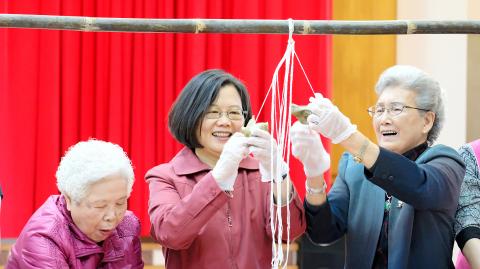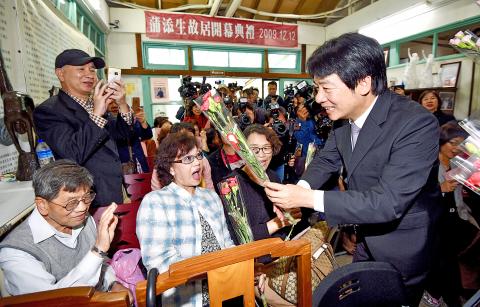Controversy over whether the Democratic Progressive Party (DPP) should use cellphone surveys when nominating a presidential candidate yesterday sparked a battle of words between former premier William Lai (賴清德) and campaigners for President Tsai Ing-wen (蔡英文).
Lai and Tsai are competing in the party’s presidential primary.
Lai told Radio Taiwan International that he would oppose any move toward the incorporation of cellphone interviews in the polling sample, saying that the method is susceptible to fraud and statistical manipulation.

Photo: Lin Hsin-han, Taipei Times
As the identities of cellphone users are not publicly listed, their inclusion in surveys could lead to fraud via the planting of fake samples, he said, adding that such polls have not been proven to be more scientifically accurate.
The DPP has already established that it would use landline-based polling to nominate a presidential candidate and to determine legislative candidates, Lai said.
“The primary process has already been prolonged, changing the rules so late into the game yet again would be harmful to democratic institutions and the spirit of the DPP,” he said.

Photo: Peter Lo, Taipei Times
“The public is not likely to form a favorable opinion of such a decision,” he said.
Speaking for the Tsai campaign in an official capacity, Ruan Jhao-syong (阮昭雄) said that nearly 30 percent of Taiwanese — or about 5.4 million out of 18 million voters — use cellphones instead of landlines.
“Using cellphones in polls is an international trend,” the former premier said, adding that 28 million registered cellphones should be more representative and tamper-proof than 4 million landline samples.
A large number of voters either do not own landlines or could not be reached by them, he said.
It would be unfair to exclude them from polls, he said.
According to the DPP charter, the only requirement for polls conducted to nominate a candidate is that they have to be “comparative” polls that pit hopefuls and likely opponents against each other, he added.
Asked whether he is worried that his stance would appear less up to date than Tsai’s, Lai said: “No, I do not believe that will be the opinion of Taiwanese society.”
Current polling methods can address the under-representation of young voters in landline polls by weighing the age group, making cellphone polls unnecessary, he said.
Additional reporting by CNA

The Mainland Affairs Council (MAC) today condemned the Chinese Communist Party (CCP) after the Czech officials confirmed that Chinese agents had surveilled Vice President Hsiao Bi-khim (蕭美琴) during her visit to Prague in March last year. Czech Military Intelligence director Petr Bartovsky yesterday said that Chinese operatives had attempted to create the conditions to carry out a demonstrative incident involving Hsiao, going as far as to plan a collision with her car. Hsiao was vice president-elect at the time. The MAC said that it has requested an explanation and demanded a public apology from Beijing. The CCP has repeatedly ignored the desires

Many Chinese spouses required to submit proof of having renounced their Chinese household registration have either completed the process or provided affidavits ahead of the June 30 deadline, the Mainland Affairs Council (MAC) said on Thursday. Of the 12,146 people required to submit the proof, 5,534 had done so as of Wednesday, MAC deputy head and spokesperson Liang Wen-chieh (梁文傑) said. Another 2,572 people who met conditions for exemption or deferral from submitting proof of deregistration — such as those with serious illnesses or injuries — have submitted affidavits instead, he said. “As long as individuals are willing to cooperate with the legal

The Ma-anshan Nuclear Power Plant’s license has expired and it cannot simply be restarted, the Executive Yuan said today, ahead of national debates on the nuclear power referendum. The No. 2 reactor at the Ma-anshan Nuclear Power Plant in Pingtung County was disconnected from the nation’s power grid and completely shut down on May 17, the day its license expired. The government would prioritize people’s safety and conduct necessary evaluations and checks if there is a need to extend the service life of the reactor, Executive Yuan spokeswoman Michelle Lee (李慧芝) told a news conference. Lee said that the referendum would read: “Do

The Ministry of Environment yesterday held a seminar in Taipei for experts from Taiwan and Japan to exchange their experiences on the designs and development of public toilets. Japan Toilet Association chairman Kohei Yamamoto said that he was impressed with the eco-toilet set up at Daan Forest Park, adding that Japan still faces issues regarding public restrooms despite the progress it made over the past decades. For example, an all-gender toilet was set up in Kabukicho in Tokyo’s Shinjuku District several years ago, but it caused a public backlash and was rebuilt into traditional men’s and women’s toilets, he said. Japan Toilet Association